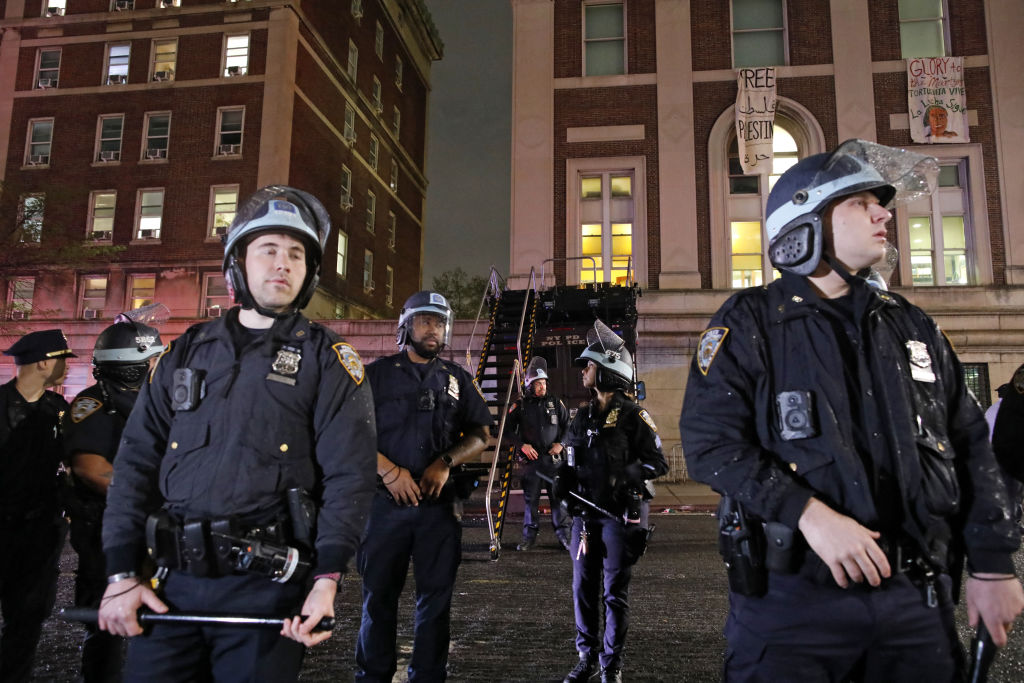It has not escaped the attention of media observers that the current outbreak of violent campus demonstrations is but the latest in a series of disruptive left-wing movements, starting with Occupy Wall Street in 2012, followed by the Black Lives Matter riots over the summer of 2020 and now the anti-Israel protests. The right, too, has been associated with disorderly conduct — most notably during January 6 and the Charlottesville rallies — but neither of these events were as well-planned or long lasting as what progressives have been up to. And this fact has led many journalists to speculate as to why the American left has become so attached to civil disobedience. In a recent editorial, the Wall Street Journal puts the blame squarely on the unwillingness of responsible authorities to stand up to lawbreaking. “The mass-protest method has become the political default for progressives,” it argues, “because it often gets them what they want.”
Other media outlets have focused on the role of social justice nonprofits such as George Soros’s Open Society, the Rockefeller Brothers Fund and the Tides foundation, many of which appear to be funding professional demonstrators to organize the left’s unrest. As well as on the impact of the Vietnam-era protesters who went into higher education, where they now support a new generation of student activists.
Yet, while all these suggested influences have undoubtedly played a part in shaping the aggressive behavior of today’s left, none has satisfactorily explained the actual cause of it. For in a functioning democracy the repeated resort to violence and intimidation is rarely the preferred tactic of any political faction which believes its arguments will eventually carry the day.
For the left to so often conclude that it must “get pushy” to have an impact, there has to be something far more desperate at work than weak-willed administrators, subversive funders or 1960s holdovers on the faculty. And not just the frustration of knowing that one’s ideology has thus far failed to win more converts than it has, but more likely the suspicion that it is never going to be widely accepted.
Certainly, what has historically been the left’s most appealing claim — that it is possible for a bigger and more powerful government to improve the welfare of its people — has suffered major setbacks in recent years. From the belated recognition of how much was wasted on Lyndon B. Johnson’s $22 trillion Great Society legislation to widespread dissatisfaction with the way authorities handled Covid lockdowns to President Biden’s own failed $1.2 trillion effort to fund an electric car Americans would want to buy, confidence in the public sector has clearly been shaken. According to a poll published last September by Pew Charitable Trust, faith in the wisdom of the state has fallen to the lowest points in seven decades, with only 20 percent of respondents saying they trust government all or most of the time. Similar polling from the Associated Press and the NORC Center for Public Affairs Research finds that trust in government has actually collapsed to the point where it detracts from people’s willingness to rely on any institution, from a Wall Street bank to organized religion.
Progressives have been equally unsuccessful in persuading Americans of their operating assumption that the world is neatly divided into two kinds of countries, the oppressors and the oppressed — and that the US’s relative prosperity automatically identifies it as an exploiter of other cultures. This worldview may have infected some of our nation’s most elite institutions, but average citizens clearly have no interest in either making their children feel guilty over of their relative “privilege” or in repaying the rest of the world for the country’s supposed past sins.
During Covid, for example, when parents were able to see the anticolonial ideology their children were being taught at the local public school via Zoom videos, their reaction was to give a critical boost to a revolution in K-12 education which is still unfolding. Since the end of the pandemic, Arizona, Florida, Ohio and nine other states have all passed legislation allowing families to use some of the tax money designated for their children’s educations on private schools and other placements, with at least eight more states expected to enact similar bills by the end of 2024.
The growing controversy over President Biden’s open border policy reflects a similar resistance to the idea that any successful country must automatically be presumed to have stolen its wealth from less affluent ones. For while most citizens remain happy to welcome the millions of migrants who legally move to the US every year, few believe that any foreign national has a right to just “walk in,” as if morally entitled to share in what has unfairly been taken from him.
And when it comes to the current conflict between Israel and Hamas, the progressive argument that the Jewish state should be seen as the villain simply because of its relative prosperity clearly has not caught on with Main Street. A May 2 YouGov poll for the Economist found that just 28 percent of respondents are sympathetic to pro-Palestinians demonstrations, while 47 percent oppose them and the rest have no opinion.
If the average American’s enduring suspicion of big government and instinctive rejection of anticolonial ideology have not made it difficult enough for progressives, there is now the very practical matter of the federal debt, which is currently closing in on $35 trillion. Given that government spending has become increasingly associated in the public mind with inflation and that more than three-quarters of voters feel they have been badly hurt by it, the left is rapidly losing what has historically been its most effective method for attracting supporters — promising to champion some new subsidy or entitlement which would benefit them.
Not that progressives are prevented from still trying to enact costly legislation, but it has become much harder to do so without addressing the financial consequences. Whereas left-wing politicians could at one time gloss over any debt concerns by referring to Modern Monetary Theory (the belief that deficits do not matter), they are now under growing public pressure to outline exactly what combination of tax increases and budget reductions is going to pay for their proposed spending. Which means that any attempt to buy favor with one group is automatically going to antagonize others.
Of course, none of this has stopped the left’s activist base from periodically trying to advance some part of the progressive agenda through disruption and intimidation. But as inconvenient — and when it comes to something like antisemitism, as offensive — as this tactic can be for the larger public, we should never forget what a weak political position it ultimately represents. For in a country like the US, where every faction has a chance to make its case, the only group which would repeatedly cross the line from peaceful protesting to unlawful rioting is the one which not only knows it is losing but which deep down suspects it will never turn the tide.


























Leave a Reply